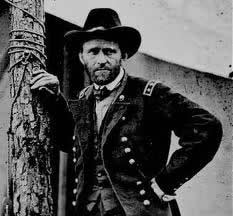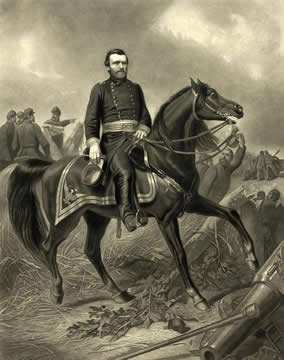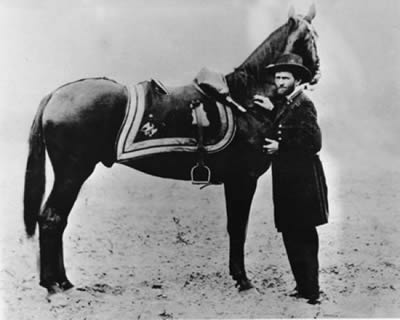Aggressive Christianity
What Christians can learn from U. S. Grant

by Dennis Pollock
The Christian experience is sometimes likened in the Scriptures to being a soldier in the thick of battle. Paul writes that the "weapons of our warfare are not carnal but mighty in God…" (2 Corinthians 10:4). To Timothy he writes, "You therefore must endure hardship as a good soldier of Jesus Christ." He goes on to say, "No one engaged in warfare entangles himself with the affairs of this life, that he may please him who enlisted him as a soldier" (2 Timothy 2:3,4).
Since there is a parallel between physical and spiritual warfare, we would do well to consider those attributes that make an effective warrior. I have been reminded of this recently while reading a book called Leadership Lessons from General Ulysses S. Grant by Al Kaltman. For those ignorant of U. S. History, Grant was the north's premier general during America's Civil War, a terrible conflict that lasted from 1861 – 1865. In those four short years our nation lost between 600,000 to 700,000 young men – more blood shed in war than in all the other American wars from the Revolutionary War to Viet Nam.
Timid Generals
When President Lincoln made Grant the head of the Union armies, he was following a succession of generals who had proven incompetent. Most of them, starting with the popular George McClellan, had been timid souls who engaged in battle only if they felt conditions were nearly perfect and withdrew at the first sign things were going wrong. This would be followed by a hasty retreat behind the nearest river, and a lengthy wait while their armies were given fresh troops, lots more equipment, and plenty of time to regroup. Grant was of a different mind. Although a gentle and quiet man in personality, as a leader he possessed an aggressive streak in him that refused to back down. He once said, "The art of war is simple enough. Find out where your enemy is. Get at him as soon as you can. Strike him as hard as you can, and keep moving on." He followed that philosophy to the letter, and from the time Lincoln appointed him head of the Federal armies, the South's days were numbered. Within a year the famous Confederate General Robert E. Lee had surrendered and the war quickly came to a halt.
As a young man Grant's father encouraged him to go into a military career fearing his son had no aptitude for business. As it turned out, Daddy knew best. Grant did go to West Point but was far from outstanding, graduating twenty-first in his class of thirty-nine. He was at the bottom of his class in the study of military tactics. He did manage to get promoted to the rank of "cadet-sergeant" but his many demotions caused him to lose that rank and go back to being a private. He would never have been chosen by his peers as "most likely to succeed."
Of course in time Grand did succeed and he succeeded masterfully. There were gifts in him, hidden from view in his youth, that would eventually emerge and make him one of the greatest generals ever to stride onto a battlefield. There is a parallel to the Christian life here. Every believer in Christ is given gifts for the building up of the body of Christ. Paul writes, "Having then gifts differing according to the grace that is given to us, let us use them" (Romans 12:6). But these gifts to not have the same "ripening time." One man may be fully operating in his gifts by the age of twenty-five and another may only begin to see the fullness of God's plan and the operation of the Spirit's gifts until in his fifties. Moses was 80 before God's plan for his life began to really take off.
Years of Struggle
 After graduating Grant spent a number of years serving in the military, but made no great impression on his superiors. When his career seemed to bog down, he resigned and decided to try his hand in the civilian world. Failure seemed to dog him at every turn. He farmed but couldn't make a go of it. He entered a real estate business with his brother-in-law and failed miserably. He tried bill collecting but didn't have the heart to get tough with the slackers. One year things were so tight that he pawned his watch in order to buy Christmas presents for his family. Anyone observing this decent but seemingly inept man would have laughed at the thought that in a few short years he would become the nation's greatest general, and would go on to serve two terms as the president of the United States. Indeed Grant himself would have thought it a good joke.
After graduating Grant spent a number of years serving in the military, but made no great impression on his superiors. When his career seemed to bog down, he resigned and decided to try his hand in the civilian world. Failure seemed to dog him at every turn. He farmed but couldn't make a go of it. He entered a real estate business with his brother-in-law and failed miserably. He tried bill collecting but didn't have the heart to get tough with the slackers. One year things were so tight that he pawned his watch in order to buy Christmas presents for his family. Anyone observing this decent but seemingly inept man would have laughed at the thought that in a few short years he would become the nation's greatest general, and would go on to serve two terms as the president of the United States. Indeed Grant himself would have thought it a good joke.
Destiny is a funny thing. It takes no opinion polls, consults no experts, and pays little attention to early failures. In Jacob's early days, certainly no one would have nominated him for God's hall of fame. Billy Graham was once told by the president of a Bible college that if he left there, as he was planning to do, he would never amount to anything more than a country preacher. Billy Graham did leave that school, and the president was proven a false prophet. I sometimes think God gets a hearty laugh at our predictions of who will fail and who will succeed in the things of the kingdom. The One who loves to use the foolish things of the world to confuse and amaze the wise, delights to take men and women for whom the world has little use, and raise them up for His purposes and His glory.
When the Civil War began Grant felt it his duty to offer his services to his nation. He wrote a letter to the Adjutant General, reminding him of his West Point education, and requesting an appointment to command a regiment. Despite the army's desperate need for trained officers, strangely the letter was completely ignored. Later he traveled to meet the Union's commanding general, George McClellan, but appearing at his office two straight days he was never received. Finally he got the governor of Illinois to appoint him colonel over an Illinois regiment, and Grant was off and running.
War Years
Grant learned a lesson about war in his early days that was to serve him well throughout his career. As he was advancing upon the Confederate troops it looked as if he would get his first taste of battle. Fear began to grip him and his heart seemed to rise higher and higher until it felt like it was in his throat. As he came near where he thought the enemy lay in wait, he was terrified. Still he marched on, not knowing what else to do. Finally they came upon the enemy's camp, but it was deserted. The enemy commander, apparently fearing he would be overrun by Grant, had retreated. This was a revelation for Grant. He wrote later, "It occurred to me at once that Harris (the Rebel commander) had been as much afraid of me as I had been of him. This was a view of the question I had never taken before." Grant received an immediate infusion of courage, and never seemed to be intimidated by the enemy the rest of the war.
When Grant first took possession of the Army of the Potomac with the assignment of destroying Robert E. Lee's army, he heard all kinds of talk about how cunning, how smart, and how wily Lee was. Grant's own men seemed to have doubts about whether their new leader could whip the mythical "Bobby Lee," who had outfoxed all the previous generals. Grant soon became weary of such talk and remarked, "I am heartily tired of hearing about what Lee is going to do. Some of you always seem to think he is suddenly going to turn a double somersault, and land in our rear and on both of our flanks at the same time. Go back to your command, and try to think what are we going to do ourselves, instead of what Lee is going to do." This was indeed Grant's personal policy. It was said that he rarely worried about what the enemy would do and was far more involved planning what he wanted to do.
Many Christians give the devil far too much credit. They are always talking about what he is up to, how they are being attacked, and they seem to possess an almost totally defensive posture in spiritual warfare. Instead of planning to go out and plunder the enemy's territory and win souls for Christ, they focus on trying to keep themselves safe. Most of the time the best defense is a good offense. Yes, the devil is real, and yes, we will be attacked, but we cannot spend all our time worrying about what Satan is up to. There are souls to be won, churches to be established, evangelistic campaigns to be conducted, children to be trained, classes to be held, books to be written, captives to be delivered, and broken hearts to be mended. Let us be up and doing in Christ's name and in the power of the Holy Spirit. Satan will have a harder time hitting a moving target than one who is hunkered down, waiting for the next blow to fall.
Grant first engaged Robert E. Lee in a terrible battle known as the Battle of the Wilderness. Some called the battle a draw, but Grant lost far more men: 17,000 casualties to Lee's 7,000. After a couple of days of fighting Grant disengaged and began to draw his troops back. The men were saying to themselves, "Here we go again." As they reached a crossroads the two paths led either to the north or to the south. The path to the north meant retreat, the path to the south – another battle. Grant sat on his horse pointing with his sword to the southern trail. Excitement and hope rose up in the soldiers. This general was not like the others. He was ready to go at it again – and soon! Horace Porter wrote, "Wild cheers echoed through the forest. Men swung their hats, tossed up their arms… The night march had become a triumphal procession."
"He fights!"

General Grant would go at Robert E. Lee's army again and again. Some days he would lose more men, and other days Lee would lose more. But Grant knew a secret that the other generals had somehow missed. He knew the Federal armies had far more men and far more guns than their opponents. And should they run low on troops, guns, or ammunition, the northern states could send them plenty more still. The South, on the other hand, was down to the bottom of the barrel. By the final year they were fielding white haired grandfathers and thirteen year old boys in their battles. They had neither the manpower, the resources, nor the industrial base to match the north. All Grant had to do was keep on fighting, keep on pressing, keep on pushing, and the house of the Confederacy would soon collapse. Earlier some of Lincoln's advisers asked the president to dismiss the aggressive general, calling him a butcher of his own men. The president famously declared, "I can't spare that man – he fights!" Grant suffered far more casualties than any other Union general, but in the end it was Ulysses S. Grant that the distinguished Robert E. Lee rode to meet that fateful day at Appomattox, seeking terms of surrender.
How we Christians need a great big dose of holy aggressiveness, as we "fight the fight of faith!" The enemy is real and the stakes are high. But like Grant we have a secret that gives us the courage to endure. We know that our side has all the advantages. Our resources are infinite, our Lord is undefeatable, and the power within us can never be matched by the power that is in this world. If we cannot beat the devil in a single battle, or a single day's prayer, we will fight on and pray on until we exhaust the enemy's resources. Jesus tells us "men always ought to pray and not lose heart" (Luke 18:1).
Paul writes, "Now thanks be to God who always leads us in triumph in Christ, and through us diffuses the fragrance of His knowledge in every place" (2 Corinthians 2:14). In Jesus Christ we have victory, in Jesus we have fruitfulness, our prayers are answered, and the enemy's camp is plundered. Let us take our marching orders from our great General, who is also our best Friend and our Savior, Jesus Christ. Let us be about His business, the winning of souls and the building up of His church. This is the most noble warfare ever, and as we abide in Jesus the results are guaranteed. We shall triumph.
![]()
For a full listing of all devos (written and audio) go to our Devo Catalog Page.
For inspirational devos, bios of Christian leaders, free downloads, and the latest SOGM news:
Your donations are needed and greatly appreciated!

















